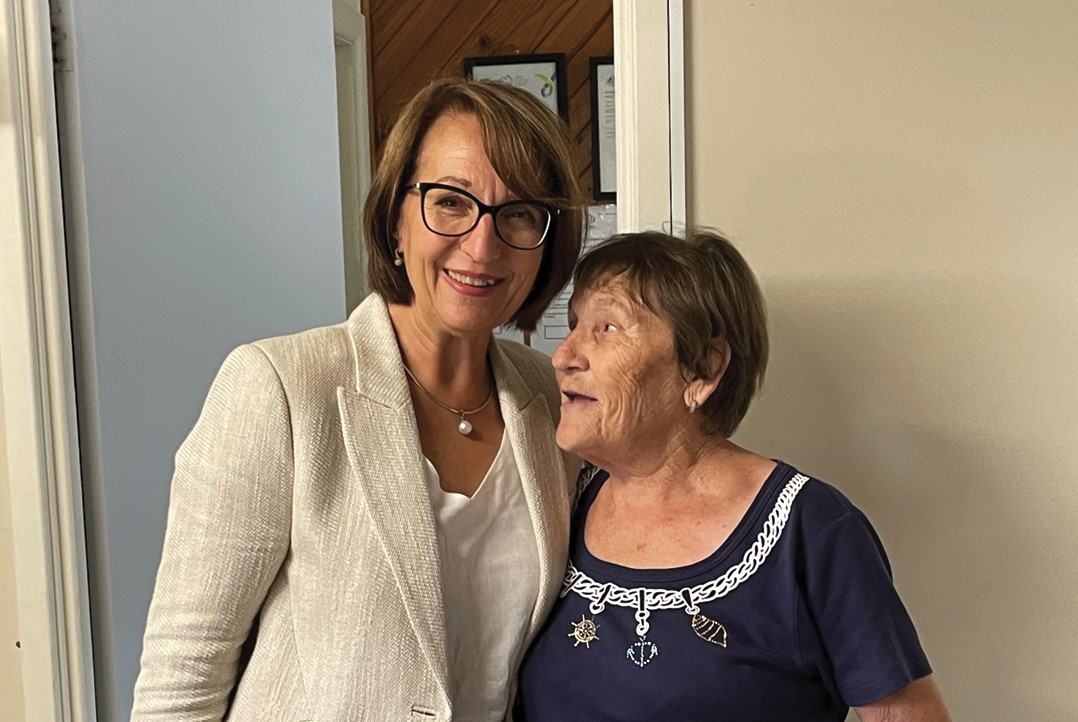After more than 20 years dedicated to the Italian community in the Illawarra, her service was recognised and rewarded with one of the most prestigious honours in the country.
Already named a Knight of the Italian Republic in 2009 and honoured in 2015 with the NSW Premier’s Award as the City of Wollongong’s Woman of the Year, Giovanna Cardamone tells her story as an Italian migrant originally from Falerna-Scalo, in the province of Catanzaro, a small town in Calabria.
“I arrived in Australia with my family in January 1967. I was just a child, I had just turned eight years old,” she recalls, retracing her troubled migration journey.
“It was a very different country from the one we live in today, the concept of multiculturalism was not there, there was not the support that there is today for foreigners.”
At a young age, two formative events marked her deeply, both of which occurred at school. After arriving in Australia, she initially lived with an aunt for a few months and attended public school.
It was a very traumatic experience for her because, although there were many migrants, the school was located in an area still predominantly populated by Anglo-Saxons.
“I didn’t understand a word of English, I was in a classroom where I didn’t even know how to ask to go to the bathroom, I was repeating to myself that I just wanted to go home,” she explains.
Later, her parents moved to Port Kembla, where there were many multicultural communities. Cardamone remembers being lucky enough to have an Australian teacher who taught her how to read and write in English after class hours, and it was only then that she really began to integrate.
The newly awarded medallist explains the path that led her to take her first steps in the Illawarra Italian community.
“I went to college and got a double degree in sociology and Italian language and culture,” she recounts.
“When I finished my education, I started working in the public service, in different state government departments. My main contact with Italians was obviously through my family.
“Then I had a child and was away from working life for a while, until one day I was asked if I would be interested in a position within Itsowel, the Italian Social Welfare Organisation in Wollongong, where it involved having to manage the funding for the organisation.”
Cardamone enthusiastically accepted the role, and even dedicated unpaid overtime hours volunteering, as there was so much work to be done.
“The organisation was young and there was no director and no coordinator at that time,” she reveals.
I took on this role which became very challenging because 20 years ago Itsowel was not what it is today, it received very little funding with little or no structure in the organisation. For five hours a week I started to meet with the community, I understood what was going on out there with the Italians and what we could do concretely. It was working a little bit part-time paid and a little bit volunteering, it took a long time to get where we are today, it was like building an organisation from scratch. But it really put me in direct contact with my community, giving me the opportunity to get to know them to see what service to provide, it was about building relationships, being recognised by the authorities in the area, in short it was about being heard.
Cardamone recounts an anecdote that moved her, making her realise how deeply these seniors were still connected to their homeland.
On June 2, Republic Day, Itsowel organised a party for the elderly with a lunch prepared in full Italian style, with various activities including music and dancing.
At the end, Cardamone asked a lady with dementia if she had enjoyed herself, to which she replied, “My feet are on this earth, my heart, on the other hand, I left it in another land and my head keeps going back there.”
When Cardamone asked her to repeat what she had said in a louder voice so that others could hear, she replied, “What did I say? I’ve already forgotten!” triggering laughter from the entire room.
“My mission is to try to make sure that our history as migrants is not forgotten,” explains the medallist who has come up with many initiatives.
One such initiative is the online virtual museum that continues to collect stories of migration both in written form and through photos, documents and objects migrants brought with them to Australia.
There’s also the “Hope in Music” program, which came about because Cardamone saw how the elderly reacted when they listened to music.
Songs from when they were young, from their region, were scouted for this project. The playlist is now available on Spotify.
“The response from people with dementia has been incredible,” she reveals.
“My backyard your backyard” is a video about the gardens of some Italian-Australians. “It was important that these influences be captured for future generations as well, otherwise so much of this would be lost.”
The head of Itsowel has always tirelessly fought for the rights of Italian migrants in Australia to ensure that the voices of the most vulnerable in our society are heard.
One of the most prevalent issues among the elderly in the Illawarra is social isolation. Reaching a certain age, the elderly want to remain in their home environment and would like their relatives to take care of them.
But one has to deal with an ever-changing society. Today’s daughters and granddaughters work and have careers. They do not stay at home to care for the elderly.
When asked what the community can do to combat the social isolation of older people, Cardamone says, “It’s essential to provide socialisation opportunities so that these people can maintain friendships and stay connected to their community.”
“It was an honour to receive this recognition from Australian institutions and recognition from the Australian government for what I do for our community, which has played a crucial role in this country,’ she says.
“Making sure that these people are treated respectfully and not forgotten have always been my goals.
“I have been fortunate to have grown up here because this country has made me who I am.
“It has given me the opportunity to have a voice even though a part of me is still in Italy and will be forever.”












